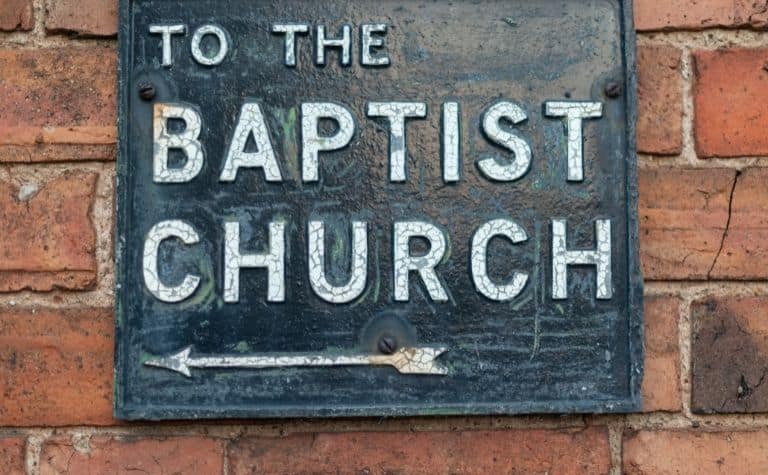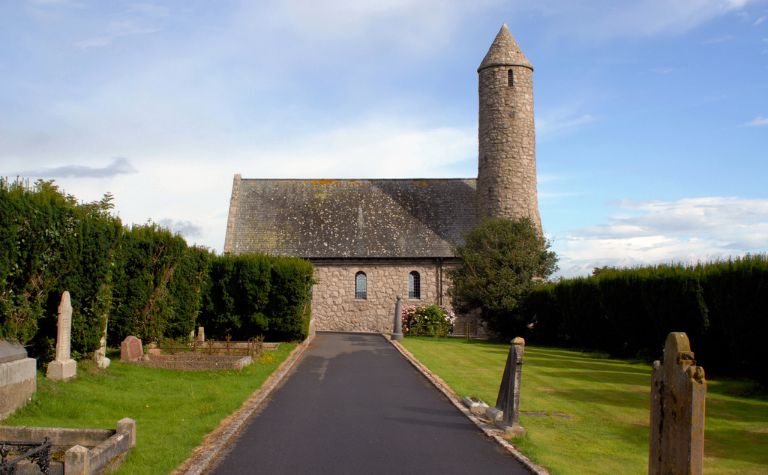Episcopalian and Baptist are two of the largest branches of the Christian faith in America, though churches belonging to each tradition can also be found around the world. Many people know that “Episcopal” and “Baptist” are names of denominations and churches, but they aren’t sure what the differences are between them.
The Episcopalian Church, with roots in the Anglican communion, is halfway between Catholic and Protestant in theology and practice. The Baptist tradition is firmly entrenched in Protestantism. Though the denominations have similarities, like belief in the Trinity, they also have significant differences.
What do the terms “Episcopalian” and “Baptist” mean? Why did both traditions have unique experiences in America in particular? Do they believe the same regarding the Bible, Jesus Christ, the Holy Spirit, and the end times? Keep reading to learn the answers to these questions and others.
Also, see Episcopalian vs. Non-Denominational: What’s the Difference? to learn more.

Episcopalian and Baptist Comparison
| Episcopalian | Baptist | |
|---|---|---|
| Name | From the Greek word for “overseer” and the Latin word for “bishop,” the term refers to a form of church government that locates ecclesiastical authority in the office of bishop as opposed to the papacy or congregational membership. The term also describes the largest tradition in the Anglican communion in America. | The word “Baptist” comes from the practice of “Believer’s Baptism,” which is the conviction that only professing Christians should be baptized, not infants. The Baptist tradition, however, has other values and emphases in addition to Believer’s Baptism. |
| Origin | The Anglican tradition dates to the time of King Henry VIII (1491-1547) and his protests against the Catholic church. Anglicanism arrived in America as soon as settlers arrived from England. The “Episcopalian” church dates to the time of the Revolutionary War (1775-1783) when terms like “Anglican” and “Church of England” were out of favor. | Baptist denominations and churches have roots in the 17th-century Puritan and Anabaptist traditions in England. Early Baptists identified as Separatists or Congregationalists and championed individual responsibility in relation to baptism and church membership. Valuing autonomy aligned with American ideals, which helped the tradition flourish in the states. |
| Branch of Christianity | Because its part of the Anglican Communion, many people consider Episcopalianism halfway between Protestantism and Catholicism. Many theologians and historians posit that a church can’t be “halfway Catholic,” so it’s best to consider the tradition Protestant with aspects of Catholicism woven into certain churches. | All Baptist traditions are Protestant, so they have agreements and disagreements with Episcopalians. For example, they reject Catholicism’s belief in transubstantiation. Unlike Episcopalians, they favor a congregational form of church government in which the members vote on key decisions for their church. |
| Early influencers | King Edward VI (1537-1553), Queen Elizabeth I (1533-1603), theologian Richard Hooker (1554-1600) | John Smyth (1570-1612), Roger Williams (1603-1683) |
| Episcopalian | Baptist | |
|---|---|---|
| Organization | The word “episcopal” comes from the Greek word for “overseer” and the Latin word for “bishop.” It refers to a form of church government that locates ecclesiastical authority in the office of bishop as opposed to the papacy, like in Catholicism, or the congregation, like in some Protestant traditions. | The Baptist tradition values church autonomy, which is found in every denomination. Denominational and network leaders provide support and guidance for local churches, but the congregation has the final say on all significant matters. |
| Authority | Historically, Episcopalianism, like the Anglican communion, values the Bible, though some don’t consider it the sole authority. The tradition affirms the Apostles’ Creed and the Nicene Creed. The Book of Common Prayer is also a pivotal document to the heart and identity of the tradition. | Like other Protestants, Baptists have historically upheld the Bible as the sole authority for Christians and churches. There are many “Baptist Confessions,” each of which expresses the convictions of a Baptist community at a certain place and time. For example, one famous belief statement is “The First London Baptist Confession of 1644.” |
| Divisions | The denomination called the “Episcopal Church” is the largest body in the tradition by a significant margin. Episcopal churches have split over theological, political, and social issues. Examples of contentious topics include women in ministry, allegations of devaluing Scripture, and issues related to same-sex marriage and gender identification. | The Baptist church is one of the most diverse traditions in Protestant Christianity. Division at the time of the Civil War is a blemish on the tradition’s rich history. There are Arminian Baptists and Calvinist Baptists. There are some who are politically conservative (e.g., The Southern Baptist Convention) and others that are liberal and progressive (e.g., American Baptist Churches USA). |
| Social worldview today | The “Episcopal Church,” the largest communion in America, is socially and theologically liberal. | It depends on the denomination and church. Some Baptist denominations remain conservative, yet others have adopted modern values and sensitivities even when they contradict the historical teachings of the Baptist tradition. |
Also, see What Do Episcopalians Believe? to learn more.
Largest Episcopal Denominations
| Episcopal Denominations | Membership |
|---|---|
| Episcopal Church | 2 million |
| Anglican Church in North America | 112,000 |
| Continuing Anglican Churches | 100,000 |
| Reformed Episcopal Church | 15,000 |
Largest Baptist Denominations
| Baptist Denominations | Membership |
|---|---|
| Southern Baptist Convention | 16.1 million |
| National Baptist Convention | 5 million |
| NMBCA | 2.5 million |
| Baptist General Conference of Texas | 2.4 million |
| American Baptist Churches of America | 1.2 million |
| Cooperative Baptist Fellowship | 1 million |
| Progressive National Baptist Convention | 1 million |
| CW Baptist General Conference | 260,000 |
| American Baptist Churches | 203,000 |
| Conservative Baptist Association | 200,000 |
Also, see Episcopalian vs. Assemblies of God: What’s the Difference? to learn more.

Episcopal and Baptist Christianity: Similarities and Differences
What are the “high church” and “low church” Anglicanism and Episcopalianism?
The high church wing emphasizes the tradition’s similarities to Catholicism and practices aspects of High Mass. The low church wing emphasizes the tradition’s similarities with Protestantism and its roots in the Reformation.
- Today, some Episcopalian congregations in America emphasize beliefs and practices that are considered Catholic.
- Other churches are aligned with conservative evangelical theology, some of which embrace charismatic expressions of worship and prayer.
- Still, other Episcopal churches have largely abandoned historical Catholicism and Protestantism and have adopted liberal and progressive social-political convictions and have less theological focus.
| Episcopalian | Baptist | |
|---|---|---|
| View of the Bible | Traditionally, the “low church” has a high view of Scripture in alignment with Protestantism. The “high church” values Scripture plus ecclesiastical tradition. Liberal and progressive congregations have decentralized Scripture. Historically, members can read deutero-canonical literature or the Apocrypha, but they can’t be used to establish doctrine. | Conservative Baptist denominations and churches have a high view of Scripture and affirm the doctrines of inerrancy (i.e., that the Bible has no errors) and infallibility (i.e., that the Bible is not able to err). Liberal and progressive Baptist denominations and churches champion certain social causes as their primary source of inspiration, replacing Scripture’s teaching as first priority. |
| View of God | Episcopalians believe in the Trinity; there is one God who exists in three persons. The Father, Son, and Holy Spirit are each fully divine. | Baptists are also Trinitarian; there is one God who exists in three persons. Baptists also believe the Father, Son, and Holy Spirit are each divine. |
| View of Christ | Historically, Episcopalianism has affirmed that Jesus is the second person of the Trinity. He is God in human flesh. He is 100% God and 100% man. Jesus was born of a virgin, lived a sinless life, died as an atonement for sin, was physically resurrected on the third day, and ascended into heaven. | Baptists believe that Jesus is the second person of the Trinity. He is God in human flesh. He is 100% God and 100% man. Jesus was born of a virgin, lived a sinless life, died as an atonement for sin, and was physically resurrected on the third day. |
| View of Salvation | Episcopalianism’s roots in Anglicanism are closer to Calvinism than Arminianism. However, Arminianism grew to characterize and influence the tradition more. Today, liberal and progressive congregations are ecumenical and inclusive of other religions, not merely other Christian denominations. | Baptists believe that salvation is by grace through faith, which is a core Protestant conviction. Baptists may hold to Limited Atonement, i.e., Christ’s death was for the elect (Calvinism), or Unlimited Atonement, i.e., Christ’s death was for all (Arminianism). |
| View of the Holy Spirit | The Holy Spirit is the third person of the Trinity. He is fully divine. Episcopalians are historically cessationists (e.g., they don’t speak in tongues), yet some small communions practice charismatic worship (e.g., International Communion of the Charismatic Episcopal Church). | Baptists believe that the Holy Spirit is the third person of the Trinity. He is fully divine. The Spirit applies the salvation that the Father planned and that the Son earned for sinners. He bestows spiritual gifts on believers that they are to use for the edification of the Church. Most Baptists believe that baptism in the Holy Spirit occurs at conversion. It’s possible to subscribe to Pentecostal theology and be Baptist, and some are, but that isn’t the historic conviction of the tradition. |
Also, see What’s the Difference Between Christian Denominations? to learn more.

| Episcopalian | Baptist | |
|---|---|---|
| View of the Ordinances or Sacraments | All Episcopalian expressions recognize baptism and the Lord’s Supper. Those who have convictions that align with the high church recognize the other five that Catholicism does (e.g., penance). The Anglican-Episcopalian tradition teaches that the sacraments are a means of grace, as in Catholicism. | Baptists believe there are two sacraments: baptism and the Lord’s Supper or communion. There are only two because Christ only taught two. The Catholic Church established the others, and most Protestants, including Baptists, don’t recognize or practice them. |
| View of the Lord’s Supper | Episcopalianism believes that Christ is present in the elements, but there is a mystery to it. The tradition doesn’t fully embrace Catholicism’s theology of the Eucharist, like transubstantiation, but affirms that consuming the elements is more than simply a memorial practice. | Baptists believe consuming the bread and cup is a memorial of the atonement of Christ. They don’t believe Christ is physically present in the elements in any way. |
| View of the Baptism | Clergy baptize infants and adults; baptized individuals are “grafted into the church.” | “Believer’s Baptism” has been a core conviction of the Baptist tradition for centuries. Baptists teach that since infant baptism isn’t taught in the Bible, only professing believers should be baptized. This may include some children and young adults, but not babies or infants. |
| View of the end times | Episcopalians believe in the Second Coming of Christ. The tradition’s eschatology is Amillennial, as opposed to Premillennial or Postmilennial. | Many Baptists are Premillennial, but that viewpoint isn’t required to be a member of most denominations or churches. Some Baptists are Amillennial or Postmillennial. All views believe in the Second Coming of Christ. |
Also, see The Largest Denomination In Every State to learn more.
Please see the related articles below.
Related Questions
Catholic vs. Protestant vs. Orthodox: What's the Difference?
Roman Catholicism, Protestant Christianity, and the Eastern Orthodox Church are the three historical branches of the Christian religion. Each tradition traces its doctrines and practices to the New...
Many people have heard of the Episcopalian and Methodist denominations but don't know the differences and similarities between their respective churches. People may also be aware that both traditions...
